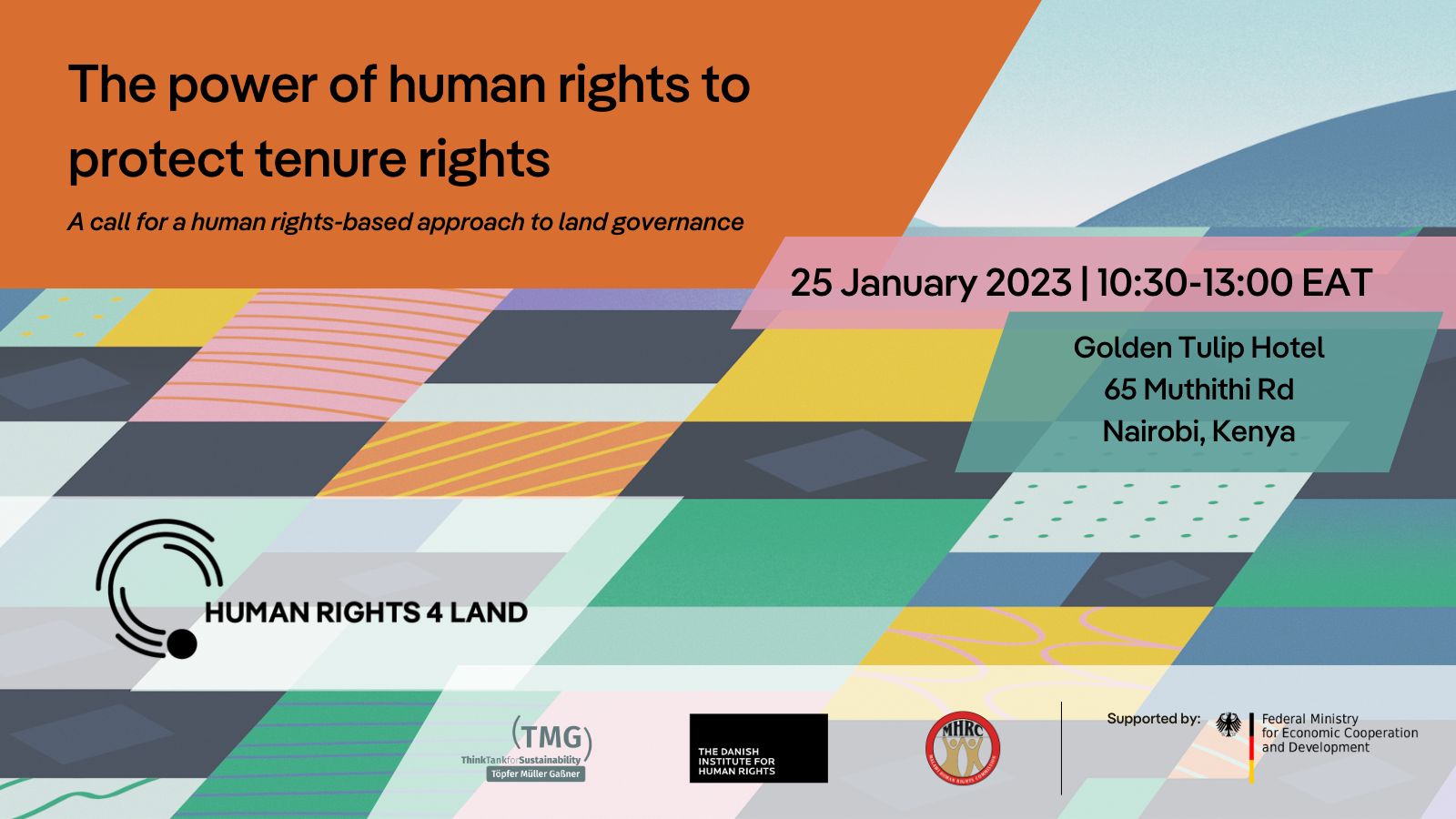Discussion
The power of human rights to protect tenure rights
A call for a human rights-based approach to land governance
The world is in the throes of a chronic food crisis. One of the root causes is insecure land tenure rights for millions of smallholder farmers and other food producers. Recognizing the fundamental links between land governance and the right to food, the Committee on World Food Security (CFS) adopted the Voluntary Guidelines on the Responsible Governance of Tenure of Land, Fisheries and Forests in the Context of National Food Security (VGGT) in 2012. While the Guidelines are voluntary, they are based on binding human rights standards and principles. Civil society organizations and other actors can therefore use human rights obligations to hold governments accountable for protecting legitimate land tenure rights of the most vulnerable populations.
The objective of this hybrid event is to reiterate the urgency of protecting tenure rights, and to discuss how a human rights-based approach and monitoring tool, can strengthen responsible land governance. Building on Malawi’s experience, national human rights institutions and civil society actors from several African countries will further explore the added value of Human Rights 4 Land Tools in addressing land rights violations and holding governments accountable to implement the VGGT. These practical tools help to identify gaps in responsible land governance and explicitly link these to human rights obligations.
Urgent call for safeguarding legitimate tenure rights
Access to land and natural resources is a prerequisite for the enjoyment of economic, social and cultural rights for billions of people around the world. This is especially true for those who directly depend on these resources for their food security and livelihoods. However, competition for access to and control over land has increased sharply in recent decades. Urbanization, infrastructure development, natural resource exploitation and intensive agriculture often take place on land (including forests) used by farmers, rural communities, pastoralists and indigenous communities. Poor and marginalized groups are also most likely to experience weak tenure security over land and other resources on which they depend for their livelihood. This leads to expropriation by more powerful actors and interests - often without meaningful consultation or fair compensation.
The potential of the VGGT: 10 years after their endorsement
The Voluntary Guidelines on the Responsible Governance of Tenure of Land, Fisheries and Forests in the Context of National Food Security (VGGT), endorsed by the UN Committee on World Food Security (CFS) in 2012, provide universally agreed principles for responsible land governance. While the Guidelines have had a significant impact on policy development at the national level and the global discourse, governments must be held accountable for their implementation and outcomes at the local level in terms of actual tenure security, especially for people who are marginalized or in a vulnerable situation.
Build on human rights to strengthen implementation of the Voluntary Guidelines
The VGGT are a voluntary international framework considered as a soft law instrument with no legal obligations. However, the Guidelines build on States' human rights obligations, including (among many others) the right to an adequate standard of living, to food and the right to housing. This means that there are opportunities to apply these binding human rights obligations and related guidance to support policy and programme development and implementation. They can also support legal proceedings at the national, regional and international levels.
Moreover, the human rights obligations referenced in the VGGT provide a robust starting point for rights holders to advocate for, and claim their legitimate rights. The results of human rights-based monitoring processes can further inform established human rights reporting mechanisms, for example those undertaken by national human rights institutions and civil society networks. Hence, these processes can support demands for greater accountability by governments in implementing land reforms and other measures to strengthen responsible land governance policies. With support from the German Federal Ministry for Economic Cooperation and Development (BMZ), TMG Research, the Danish Institute for Human Rights (DIHR) and the Malawi Human Rights Commission (MHRC) have developed a human rights-based approach to monitoring land governance monitoring. One of the core objectives is to add impetus to VGGT implementation by incorporating human rights perspectives. In this context, the partners have developed Human Rights 4 Land tools that help National Human Rights Institutions, civil society organizations, research institutions and governments to explicitly link land rights and human rights.
The Human Rights & Land Navigator
A new instrument instrument for strengthening the application of the voluntary guidelines on tenure
May 09, 2022
Date
Time
11:00 - 13:00 (UTC+3)
Organisers
TMG Research
Danish Institute for Human Rights
Malawi Human Rights Commission
Location
Hybrid (Nairobi, Kenya & Online)
Languages
English
French


